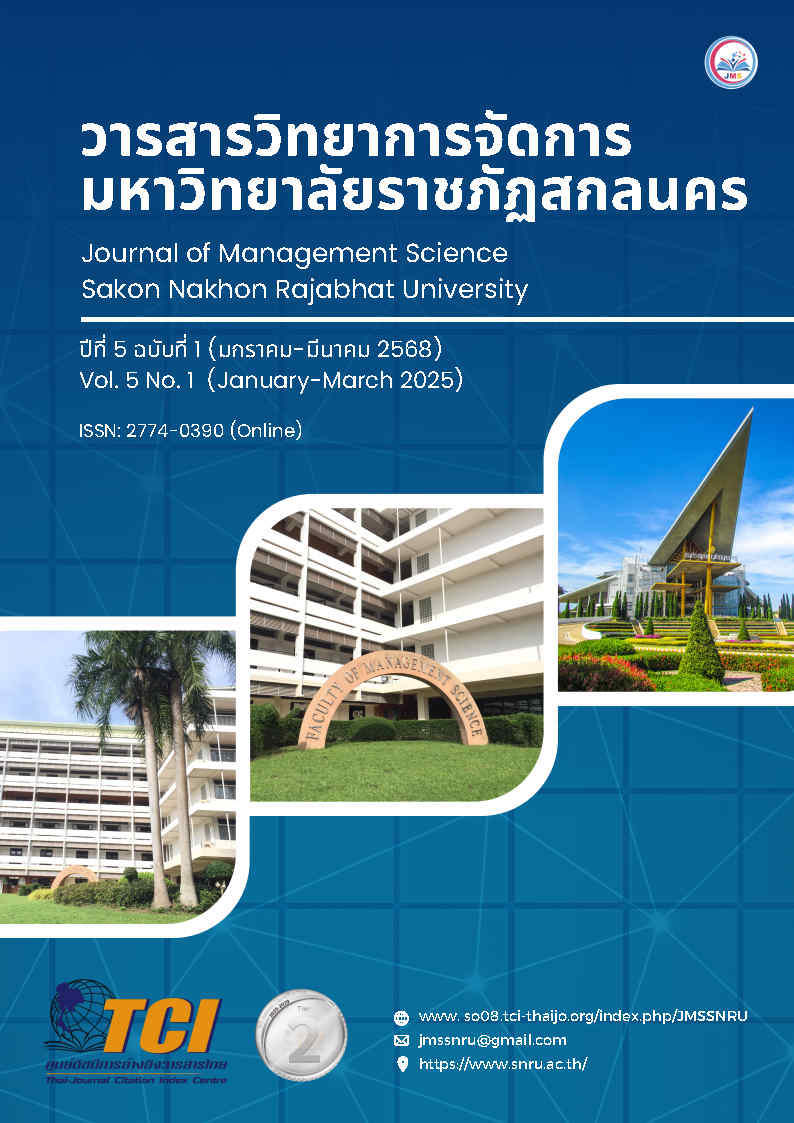Modern leadership for the development of state enterprises in the 21st century: strategies for adaptation and sustainable success
Keywords:
leadership, state enterprise, 21st centuryAbstract
The 21st century is rapidly changeable era related to technology, politics, and social issues, which affects various sectors, including state enterprise. However, both success and failure depend on the leader, who has the important role of administering the organization to meet the goal and mission. Thus, the leadership must change the roles in every aspect for state enterprise development in the 21st century. This article emphasizes leadership characteristics, leadership, and leadership roles for administering state enterprises in the 21st century. The leadership characteristics should comprise of knowledge, intelligence, communication skills, ethics, and moralities, together with adaptive leadership. The alliance leadership, strategic leadership, and equilibrium leadership, moreover, have an essential role and responsibility for environmental sustainability management, value added, organizational risk management, poverty eradication, and equality. These reinforce sustainability and state enterprise development as well as the dynamic adaptation in the 21st century. In this regard, the mentioned strategies can be applied to research and utilized in the context of leadership.
References
เกตศิรินทร์ กาญจนกังวาฬกุล และวิเชศ คำบุญรัตน์. (2565). แนวทางการพัฒนาภาวะผู้นำสำหรับผู้บริหารระดับต้นของรัฐวิสาหกิจ XYZ. วารสารสุทธิปริทัศน์, 36(3), 117-132.
จิตรประภา แสงบู่วัฒนา. (2558). แบบจำลองเชิงสาเหตุของภาวะผู้นำการเปลี่ยนแปลงและการจัดการความรู้ที่อิทธิพลต่อประสิทธิภาพการปฏิบัติงานขององค์กร กรณีศึกษา อุตสาหกรรมรถโดยสารไม่ประจำทาง. วิทยานิพนธ์บริหารธุรกิจมหาบัณฑิต มหาวิทยาลัยเทคโนโลยีราชมลคลธัญบุรี.
ณัฐภัสสร ธนาบวรพาณิชย์, พิศมัย จารุจิตติพันธ์ และพิสิฐ โอ่งเจริญ. (2563) ภาวะผู้นำและบทบาทของผู้บริหารในองค์กรรัฐในยุคการเปลี่ยนแปลง. วารสารวิชาการมหาวิทยาลัยนอร์ทกรุงเทพ, 9(1), 28-39.
ปกิตน์ สันตินิยม. (2563). ภาวะผู้นำของผู้บริหารองค์กรภายใต้ยุคการเปลี่ยนแปลงทางเทคโนโลยี. วารสารวิชาการรัฐศาสตร์และรัฐประศาสนศาสตร์, 2(2), 10-19.
นฤมล จิตรเอื้อ, เฉลิมชัย กิตติศักดิ์นาวนิ และนลินณัฐ ดีสวัสดิ์. (2560). บทบาทภาวะผู้นำในการพัฒนาองค์การแห่งการเรียนรู้. วารสารวิชาการ Veridian E-Journal, 10(2), 1738-1754.
ผกากาญจน์ ปฐมาญาดา. (2565). แนวทางการบริหารจัดการทรัพยากรมนุษย์ภาครัฐอย่างยั่งยืนในศตวรรษที่ 21 ภาครัฐ. วารสารนวัตกรรมการบริหารและการจัดการ, 10(1), 1-14.
พระมหายุทธพิชาญ โยธสาสโน, พระครูเกษมอาจารสุนทร, พระครูสุธรรมกิจโกศล และพรพิมล โพธิ์ชัยหล้า. (2566). ผู้นำและภาวะผู้นำที่พึงประสงค์. วารสารวนัมฎองแหรกพุทธศาสตรปริทรรศน์, 10(1), 153-168.
มุกดา ลอยนภา, ช่อเพชร เบ้าเงิน และอรสา จรูญธรรม. (2564). ความสัมพันธ์ระหว่างภาวะผู้นำในศตวรรษที่ 21 กับบทบาทการบริหารสิ่งแวดล้อมในสถานศึกษาของผู้บริหารสถานศึกษาสังกัดสำนักงานเขตพื้นที่การศึกษาประถมศึกษาภาคกลาง. วารสาร มจร บาฬีศึกษาพุทธโฆสปริทรรศน์, 7(1), 190-202.
สุทธิพงษ์ เกียรติวิชญ์. (2562). ภาวะผู้นำเชิงประสาทวิทยา : การประยุกต์ใช้ประสาทวิทยาศาสตร์กับภาวะผู้นำและการบริหารจัดการภาครัฐแนวใหม่. ดุษฎีนิพนธ์ปรัชญาดุษฎีบัณฑิต สาขาวิชารัฐประศาสนศาสตร์ สถาบันรัฐประศาสนศาสตร์และนโยบายสาธารณะ: มหาวิทยาลัยรังสิต.
เสกสรรค์ สนวา, ฉัตรณรงค์ศักดิ์ สุธรรมดี และวิไลลักษณ์ ขาวสะอาด. (2561). คุณลักษณะของผู้นำองค์กรภาครัฐสมัยใหม่. วารสารมนุษยศาสตร์และสังคมศาสตร์ มหาวิทยาลัยราชภัฏสุรินทร์, 20(2), 399-411.
อภิสิทธิ์ คุณวรปัญญา. (2566). การจัดการทุนมนุษย์ในศตวรรษที่ 21: บริบทความท้าทายในองค์การภาครัฐ. วารสารสถาบันวิจัยญาณสังวร มหาวิทยาลัยมหามกุฏราชวิทยาลัย, 14(1), 105-127.
Bass, B. M. (1985). Leadership and performance beyond expectations. New York: Free Press.
Bennis, W. (2003). On becoming a leader: The Leadership Classic. New York: Basic Books.
Burns, J. M. (1978). Leadership. New York: Harper & Row.
Drucker, P. F. (1993). The practice of management. Harper Collins.
Goleman, D. (1995). Emotional intelligence. New York: Bantam Books.
Heracleous, L. & Wirtz, J. (2009). Strategic management at Singapore Airlines: Achieving sustainable advantage through dual strategy. Journal of Air Transport Management, 15(2009), 274-279. doi:10.1016/j.jairtraman.2008.11.011.
Downloads
Published
How to Cite
Issue
Section
License
Copyright (c) 2025 Journal of Management Science Sakon Nakhon Rajabhat University

This work is licensed under a Creative Commons Attribution-NonCommercial 4.0 International License.
An article published in the Journal of Management Science. Sakon Nakhon Rajabhat University is the opinion, copyright and responsibility of the author of the work.







